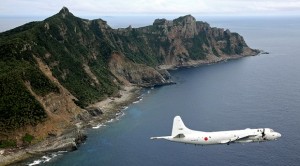China defends air defense zone, hits back at critics

Japan Maritime Self-Defense Force’s P-3C Orion surveillance plane flies over the disputed islands in the East China Sea, called the Senkaku in Japan and Diaoyu in China in this 2011 file photo. AP FILE PHOTO
MANILA, Philippines – China’s Ministry of National Defense defended their establishment of an Air Defense Identification Zone (ADIZ) over the East China Sea and hit back at other countries saying they made “irresponsible remarks.”
“We have noticed that a very few countries have said that China’s setting up of the East China Sea ADIZ has unilaterally altered the East China Sea’s status quo, and escalated regional tension,” China Ministry of National Defense spokesman Geng Yansheng said in a statement posted by China’s official Xinhua News Agency Wednesday.
“The fact is that they established an ADIZ as early as 1969 and later expanded its scope many times to only 130 km toward our coastline from its west end, which covers most of the airspace of the East China Sea, so they are not qualified at all to make irresponsible remarks on China’s lawful and rational act,” he said.
Japan was particularly hit for “making trouble over territorial disputes, frequently sending vessels and planes to disturb Chinese ships and planes in normal exercises or training, openly making provocative remarks such as shooting down Chinese drones, playing up the so-called China threat, escalating regional tension,” among others.
“Japan’s actions have seriously harmed China’s legitimate rights and security interests, and undermined the peace and stability in East Asia. China has to take necessary reactions,” Yansheng said.
He also made references against “a very few countries” saying that they should “reflect on their actions and correct their wrong remarks and wrong doings.”
Yansheng warned against inciting “other parties or send wrong signals to make a very few countries go further on the wrong track.”
China recently announced its ADIZ over the East China Sea November 23, 2013. A day after, the United States defied the ADIZ by flying two B-52 bombers from Guam into the zone without complying the identification rules set by China.
US allies South Korea and Japan also defied the ADIZ. US Secretary of State John Kerry said in a previous statement that the zone increases tensions in the region as well as the risk of an accident.
Yansheng answered the allegations against China saying that it does not violate other countries interests and that the ADIZ was not a no-fly zone.
“An ADIZ is essentially different from territorial airspace or no-fly zones. It is not a country’s territorial airspace, but an international airspace demarcated outside the territorial airspace for the purpose of identification and early warning; it is not a no-fly zone, and will not affect the freedom of overflight, based on international laws, of other countries’ aircraft,” he said.
He said that the ADIZ serves as an early warning to defend China’s airspace.
“The zone does not aim at any specific country or target, nor does it constitute a threat to any country or region,” Yansheng said.
The Chinese military aircraft can be deployed to intercept an airplane that is deemed to be a threat.
“Fighter planes are unnecessary when an entering aircraft is found to pose no threat to us, but necessary surveillance is needed; when the entering threat is ascertained to reach a certain extent, military aircraft will be mobilized at an appropriate time to dispose of the situation.”
He however clarified that commercial civilian flights “pose no threat in most circumstances. China always respects other countries’ freedom of overflight according to international laws, so that international flights that fly normally [comply with] the rules in the East China Sea ADIZ will not be affected.”
Yansheng also said that majority of civil aviation companies, including those from Japan, that were going through the ADIZ, have complied with their rules and reported their flights.